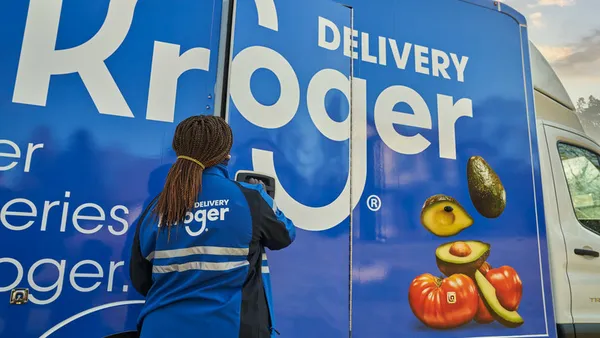Dive Brief:
- Kroger will no longer sell electronic nicotine delivery products, known as e-cigarettes, at its stores and gas stations in response to the increasing concerns about the potential negative health consequences of using them, according to a company statement.
- The company said it will sell through its current supply of e-cigarettes before exiting the category.
- The Centers for Disease Control and Prevention (CDC) has identified 18 deaths associated with the use of e-cigarette products and received over 1,000 reports of lung injury cases. The agency has also concluded that the use of e-cigarettes is unsafe for kids, teens, and adults due to the nicotine content and the potential presence of other harmful substances.
Dive Insight:
Recent reports of illnesses and deaths linked to the use of e-cigarettes have spurred debate about their safety and made the product’s future uncertain. Last month, Walmart announced it would end the sale of e-cigarette products in response to the rise of vaping-related lung diseases as state and federal officials investigate the situation. Other retailers are taking a firmer stance on tobacco including Schnucks, which recently announced it would no longer sell tobacco products.
Some cities and states are taking action. San Francisco County voted earlier this year to ban the sale of e-cigarettes. The measure is set to go into effect on January 1, 2020, though e-cigarette manufacturer Juul Labs has introduced a ballot measure hoping to repeal and replace the law. Michigan, Massachusets, Rhode Island and California have all introduced measures to limit sales.
E-cigarettes were initially touted as a safer alternative to traditional cigarettes and advanced by some as a way to help quit smoking entirely, but the new product category has become wildly popular with young consumers. More than one-third of high school seniors reported using an e-cigarette device last year, according to a National Institutes of Health survey, increasing from 28% the prior year.
Sales of e-cigarette products have increased rapidly over the past few years, with the national monthly average increasing 132% between 2012 and 2016, according to the CDC. Sales of Juul brand e-cigarettes alone increased 641% between 2016 and 2017 with an estimated 16.2 million devices sold, according to the CDC. Some estimates suggest that the global e-cigarette market could reach $53.4 billion in value by 2024. For comparison, the global tobacco market is worth roughly $888 billion.










